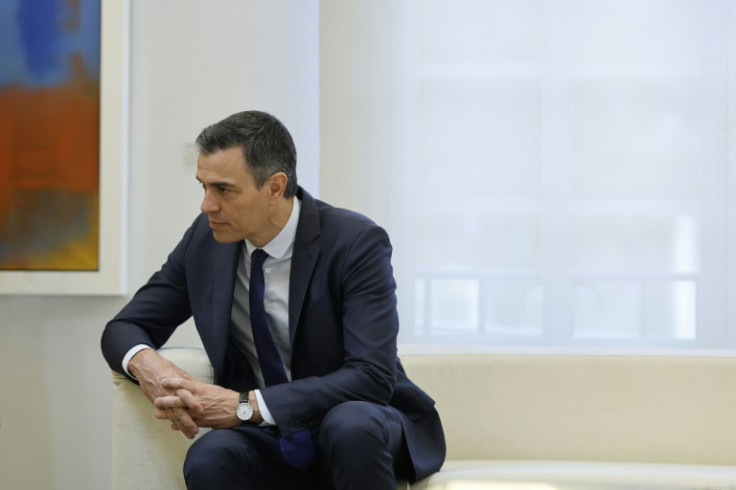
Spain's Pedro Sanchez, whose criticism of the Gaza war has raised tensions with Israel, on Wednesday addresses parliament on the conflict in remarks expected to clarify plans to recognise a Palestinian state.
The prime minister regularly addresses parliament after returning from summits or diplomatic trips such as his three-day visit to Jordan, Saudi Arabia and Qatar on April 1-3.
The trip, which was focused on Gaza, was overshadowed by an Israeli drone strike on a humanitarian convoy of the World Central Kitchen (WCK), killing seven staffers of the NGO which was founded by Spanish-American celebrity chef Jose Andres.
The WCK staffers were in Gaza to deliver food when their convoy was hit by three missiles, with Sanchez denouncing the "brutal attack".
"I expect and demand that the Israeli government clarify as soon as possible the circumstances of this brutal attack that has taken the lives of seven aid workers who were doing nothing but helping," he said while visiting a Palestinian refugee camp in Jordan.
The Gaza war erupted on October 7 when Hamas militants stormed over the border into Israel killing around 1,170 people, mostly civilians, according to an AFP tally based on official Israeli figures.
They also took more than 250 hostages, 129 of whom are still in Gaza, 34 of them dead, the Israeli army says.
Israel struck back with an unrelenting military campaign that has so far killed at least 33,360, mostly women and children, according to the health ministry in the Gaza Strip, which has been run by Hamas since 2007.
Spain's Socialist leader has repeatedly angered Israel with his outspoken comments.
In February, Sanchez and his Irish counterpart Leo Varadkar asked the European Union to "urgently" examine whether Israel was complying with its human rights obligations in Gaza as laid out in a key accord that links rights to trade ties.
And in November, Israel recalled its Madrid envoy for consultations after expressing fury over Sanchez's "outrageous remarks" in an interview with Spain's TVE public television in which he expressed "serious doubts" over the legality of Israel's actions in Gaza.
His remarks were denounced by Israeli Prime Minister Benjamin Netanyahu as "shameful" but the Israeli ambassador Rodica Radian-Gordon later returned to Madrid in January.
Israel was also angered by statements in October and November by radical left-wing ministers in Sanchez's coalition government calling for sanctions and an embargo on arms sales to Israel.
Like most other global leaders, Sanchez has called for the implementation of the two-state solution, but has also pressed for the world to recognise a Palestinian state, breaking with other Western powers who say this should only come as part of a negotiated peace with Israel.
On March 22, Spain issued a statement with Ireland, Malta and Slovenia on the sidelines of an EU leaders summit, saying they were "ready to recognise Palestine" in a move which would happen when "the circumstances are right".
Last week, Sanchez told reporters travelling with him on his Middle East tour he hoped it would happen by the end of June.
"We have to think seriously about doing it this semester," he said, referring to the first half of the year, in remarks reported by La Vanguardia daily.
In an opinion piece for Madrid's Real Instituto Elcano think tank, former Israeli ambassador Alon Liel said Spain's move to recognise a Palestinian state could "ignite the momentum that might lead to overall European and UN recognition".
If so, "Spain would become a meaningful player towards a new diplomatic momentum for the Israeli-Palestinian conflict," wrote Liel, a former director-general of the Israeli foreign ministry.
In 2014, the Spanish parliament had called on the right-wing government at the time to recognise a Palestinian state, just a few weeks after Sweden became the first EU member in western Europe to do so.
Sweden's recognition mirrored earlier moves by six other European countries: Bulgaria, Cyprus, the Czech Republic, Hungary, Poland and Romania.
Spain only established diplomatic relations with Israel in 1986, nearly 40 years after Israel became a state.







